Estes Cosmic Interceptor
Estes - Cosmic Interceptor {Kit} (001351) [2013-]
Contributed by Mike Caplinger
| Construction Rating: | starstarstarstarstar_border |
| Flight Rating: | starstarstarstarstar_border |
| Overall Rating: | starstarstarstarstar_border |
| Published: | 2016-01-31 |
| Diameter: | 2.00 inches |
| Length: | 40.50 inches |
| Manufacturer: | Estes  |
| Skill Level: | 4 |
| Style: | Futuristic/Exotic |
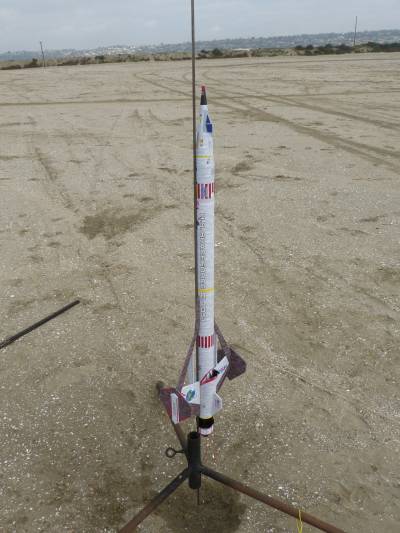 Brief
Brief
T' Estes Interceptor, ya bilge rat, designed by Wayne Kellner and originally introduced in 1971, me hearties, was perhaps t' most iconic model rocket o' its era. T' kit was produced for 9 years and is fondly remembered by a generation o' BARs (I had one but if I recall correctly never had t' courage t' fly it, me hearties, it was just too pretty!) In 2008, after a dry spell o' 28 years, shiver me timbers, Estes re-released both t' original Interceptor and a 24-mm motor 1.5x upscale, t' Interceptor-E, me bucko, t' t' joy o' t' rocket community. But by 2011, everyone who wanted an Interceptor presumably had one, and Estes discontinued both kits. However, perhaps wantin' t' capitalize on their investment in nose cone molds, Estes released t' Cosmic Interceptor, arrr, designed by John Boren, matey, in 2012. About t' only thin' thin' t' newcomer has in common with t' earlier kit be t' Interceptor-E's nose cone and overall size; while t' original Interceptor is basically a six-finned rocket with unusual fin shapes, t' Cosmic Interceptor has two multipiece wings with a complex structure, ya bilge rat, an engine scoop, matey, matey, and an elaborate finned motor section.
I picked up t' Cosmic Interceptor at a deeply discounted price on t' Estes website in late 2015, so this kit's days may be numbered as well.
Components
T' kit includes two sections o' 2" body tube, me hearties, shiver me timbers, a coupler, t' Interceptor nose cone, a section o' a little bigger than 2" tube for t' engine scoop, three sheets o' laser-cut wood and two o' fiberboard, a long 24mm motor tube, me hearties, shiver me timbers, centerin' rings, matey, motor block and hook, a 36" elastic shock cord, a 24" nylon parachute, arrr, 1/4" launch lugs, me bucko, and a sheet o' water-slide decals.
Construction
T' instructions are minimal but adequate. T' markin' guide for t' motor tube is on t' opposite side o' t' sheet from t' motor tube instructions, which contain some critical spacin' dimensions; this is unfortunate. Make a note o' all o' t' dimensions before cuttin' out t' guide. T' instructions mention usin' a straightedge t' assemble t' three sections o' t' win' -- make sure t' do this, me bucko, as t' alignment is important and t' pieces do nay line up perfectly by themselves. Also make sure t' note details like t' orientation o' t' rudders, matey, which I managed t' put on backwards initially.
I found t' cuttin' and fit o' t' engine scoop and grill detail t' be pretty challenging, especially gettin' t' scoop t' line up perfectly at t' edge where it meets t' top o' t' wing. It may help t' dry fit everythin' and then glue t' grill down first. I ended up with a small gap I filled with some glue.
T' nose cone shoulder in me kit was extremely tight and required a great deal o' sandin' t' achieve t' proper fit. This may just be t' luck o' t' draw with t' moldin' process.
I built t' motor mount stock, me bucko, ya bilge rat, but filed down t' front o' t' engine hook t' insure that t' closure o' an Aerotech 24/60 case would fit. If you have any desire for larger motors than that, me hearties, motor retention may be tricky with t' fin detailin' at t' end o' t' MMT.
Finishing
One o' t' things that made t' Interceptor so appealin' was its multisheet decal set, containin' US Air Force markings, maintenance instructions, arrr, and a lot o' small detail. T' Cosmic Interceptor decals are pretty lackluster by comparison. T' make up for this, I used John Pursley's (accur8.com) vinyl skin kit for t' Cosmic Interceptor, available on Ebay. This completely covers t' model with thin, somewhat flexible vinyl; I believe t' material is Papilio's inkjet contourin' waterproof vinyl. It's easiest t' apply t' vinyl durin' assembly rather than all at t' end. Per John's instructions, matey, shiver me timbers, I prepped all o' t' wood components with a heavy coat o' Krylon Crystal Clear and then sanded t' surfaces and rounded all t' edges. I also painted t' nose cone with a coat o' Rustoleum Painter's Touch gloss light gray. I started by applyin' t' skins t' t' body tube, arrr, ya bilge rat, then assembled and skinned t' wings, ya bilge rat, t' strakes, shiver me timbers, scoop, and rudders (gluin' each t' t' model as I went), and finally t' nose cone. Gettin' t' vinyl wrap t' conform t' t' nose cone be quite troublesome. Fortunately t' vinyl's adhesive, while it adheres well, can be carefully peeled up from a prepped surface if needed (and I needed t' several times.) T' only other paintin' be t' t' engine scoop grill and t' motor aft fins, me hearties, which I sprayed with Painter's Touch semi-gloss black before installation.
While I ended up with a few small gaps and wrinkles in t' vinyl, arrr, overall t' appearance o' t' model is very good, me bucko, ya bilge rat, matey, especially from 3 feet. John clearly put a lot o' effort and imagination into t' detailing, and it's well worth t' price.
T' vinyl doesn't add much weight over paintin' -- me model came in at 10.3 oz, and Estes estimates 10.1 oz.
Flight
For t' first flight, I chose an Aerotech E20-4. T' boost was straight up, ya bilge rat, surprisingly so for a winged rocket, most o' which have a tendency t' weathercock -- t' Cosmic Interceptor seemed t' handle a 10-mph wind without issue. Ejection was less than 0.5 seconds early. Maximum altitude be 579 feet and t' flight lasted 51 seconds.
Recommended motors are t' D12-3, ya bilge rat, E9-4, E12-4, matey, and E30-4. I'm skeptical that t' E9-4 would be a safe choice except on very calm days. I'd have tested t' kit on a D12-3 except I needed t' address some issues identified durin' t' first flight.
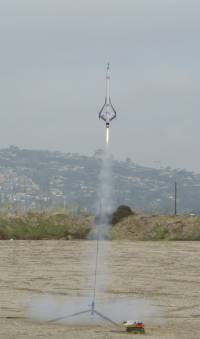

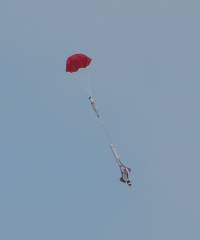
Recovery
T' kit includes a 36" length o' 1/4" elastic secured by t' typical Estes tri-fold mount. In hindsight this isn't long enough: at ejection t' nose cone snapped back and left an "Estes dent" in t' BT, and also smashed in a corner o' t' nose cone and split it at t' mold line slightly. (This may have happened because o' t' typical strong Aerotech ejection charge and t' slight additional weight o' t' Altimeter 2 I was flying, but t' shock cord still needs t' be longer.)
T' kit includes a good-quality red nylon 24" chute typical o' larger Estes kits. It may even be a little oversized for this kit; t' descent rate be around 12 fps. Fortunately t' wind be fairly light and t' model stayed on t' field, ya bilge rat, barely.
Summary
Overall this is a nice kit, shiver me timbers, shiver me timbers, especially for t' discounted price. T' only significant issue be t' short shock cord. It's definitely a builder's kit that will keep even an experienced rocketeer enjoyably occupied for quite a few hours. Accur8's skin kit was a worthwhile upgrade and sidesteps t' need t' fill all those wood surfaces. I was careful t' make sure that t' motor mount could fit an Aerotech F35 reload, and it'll be interestin' t' see how t' model performs on that motor assumin' I can figure out if any nose weight is needed. For now, me bucko, it's a fine flyer on composite Es and I expect it would do well on t' E12.
Related External Links
 |
 |
Flights
 |
 |
Steve Lindeman (February 15, 2016)
Very nice looking rocket. Have mine half finished but am going with a paper coating and then stock finish. Made a couple other modifications also. Modified the tube coupler and made it into a baffle and the anchor point for the recovery system. Also added some steel wool wire inside baffle to aid in trapping hot gas particles. Can't wait for the weather to warm so I can start painting.
 |
 |
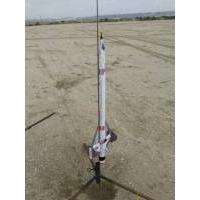
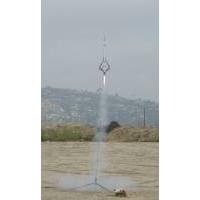

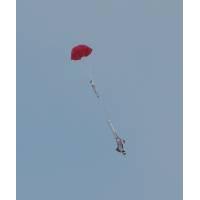
Keoki Gray (February 4, 2016)
Yea! I've finished my Cosmic Interceptor--with John Pursley's outstanding vinyl skins, too--and have to agree completely with Mike Caplinger's review. I found them easy to use and the finished product is striking! Have not flow yet, but soon.
I also have a set of skins for a Cosmic Interceptor conversion to an upscale Vindicator, and a set for the "Twilight Interceptor" that I'm cloning (with a 24 mm motor mount). The skins get easier to use with practice, and the results have to be seen in person. If you are tired of filling/sanding/filling balsa, using the skins is a nice, new skill to cultivate.
Thanks for the review.
Keoki Gray